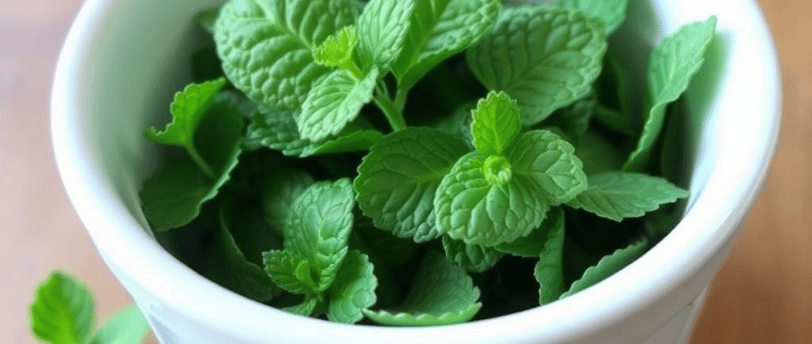Peppermint Power: Soothing Digestion Naturally
🥗DIGESTIVE HEALTH


Feeling bloated, gassy, or experiencing uncomfortable stomach pain? You're not alone. Digestive discomfort is a common issue, and while some cases require medical attention, many individuals find relief through natural remedies. Among the most popular and effective natural aids is peppermint. Known for its refreshing scent and cooling properties, peppermint has been used for centuries to ease digestive issues. Let's explore how this humble herb can help you achieve a happier, healthier gut.
Why Peppermint Works Wonders:
Peppermint's digestive benefits stem from its active component, menthol. This compound boasts several properties that contribute to gut relief:
Muscle Relaxant: Menthol acts as a muscle relaxant, particularly within the gastrointestinal (GI) tract. This helps to ease spasms in the stomach and intestines, reducing cramping and pain.
Gas Relief: By relaxing the GI muscles, peppermint can help trapped gas move through the system more easily, relieving bloating and that uncomfortable "full" feeling.
Improved Digestion: Peppermint can stimulate the production of bile, a fluid that breaks down fats in the small intestine. This aids in digestion and prevents undigested food from causing issues.
Anti-inflammatory Properties: Menthol possesses anti-inflammatory properties, which can help reduce inflammation in the gut lining, contributing to a more comfortable digestive process.
Peppermint for Specific Digestive Issues:
Peppermint has shown promise in alleviating symptoms related to various digestive conditions, including:
Irritable Bowel Syndrome (IBS): Studies have shown that peppermint oil can reduce abdominal pain, bloating, and diarrhea associated with IBS. Its muscle-relaxing effects are particularly helpful in managing IBS symptoms.
Indigestion (Dyspepsia): Peppermint can help relieve the symptoms of indigestion, such as heartburn, bloating, and nausea.
Functional Dyspepsia: Similar to indigestion, this condition features symptoms like bloating, pain, and nausea without any obvious identifiable cause. Peppermint has been shown to help manage symptoms.
How to Incorporate Peppermint into Your Regimen:
There are several ways to enjoy the digestive benefits of peppermint:
Peppermint Tea: A simple and soothing option. Steep fresh or dried peppermint leaves in hot water for 5-10 minutes.
Peppermint Oil Capsules: Enteric-coated capsules are ideal for targeting the intestines, especially for IBS sufferers. Ensure the capsule is enteric-coated, meaning it will bypass the stomach and dissolve in the intestines where it's needed most.
Peppermint Candies: A convenient on-the-go option, but be mindful of added sugar.
Fresh Peppermint Leaves: You can add fresh peppermint leaves to salads, smoothies, or even chew on them directly.
Important Considerations:
While peppermint is generally safe for most people, it's important to be aware of potential side effects and interactions:
Heartburn: In some individuals, peppermint can relax the lower esophageal sphincter, the muscle that prevents stomach acid from flowing back into the esophagus, potentially worsening heartburn.
Drug Interactions: Peppermint oil can interact with some medications, including antacids and certain heart medications. Consult with your doctor before using peppermint oil if you are taking any medications.
Pregnancy and Breastfeeding: While generally considered safe in small amounts, pregnant and breastfeeding women should consult with their doctor before using peppermint oil.
Quality Matters: When purchasing peppermint oil or supplements, choose reputable brands to ensure quality and purity.
Conclusion:
Peppermint offers a natural and effective way to ease digestive discomfort. Whether enjoyed as a soothing tea, a convenient candy, or a targeted supplement, peppermint's muscle-relaxing and anti-inflammatory properties can provide welcome relief from bloating, gas, and stomach pain. If you're struggling with digestive issues, consider incorporating peppermint into your routine – your gut will thank you! As always, consult with your doctor before making any significant changes to your diet or supplement regimen, especially if you have underlying health conditions or are taking medications.
